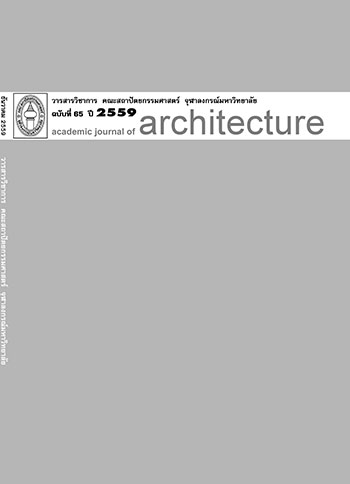Outdoor Environment for Aging with Dementia in Long-term Care Facilities, Bangkok Metropolis
Main Article Content
Abstract
The research aims to establish a criteria of appropriate outdoor environment for aging with dementia in long-term care facilities. A survey research was conducted through the survey of three long-term facilities in Bangkok: the investigation on existing condition of the outdoor environment, the observation of users’ behavior, and the interview of aging with dementia. The research findings revolve around five environmental characteristics under investigation: safety, support independence, response to dementia, support activities, and maintenance. The research reveals that all cases studies are not appropriate for the use by those aging with dementia. The support independence, the response to dementia and the support activities shows mean scores lower by the criteria of appropriate physical characteristic. The behavior mapping shows that most of the activities occurred at the semi-outdoor area rather than the outdoor area, while difficult accessibility is the main reason for the patients’ refusal to use outdoor area. The interview result indicates that most of the aging with dementia prefer well-shaded outdoor area. Finally, the positive attitude of caregivers and the policies of the administrators affect the use and the development of appropriate outdoor environment.
Article Details
References
ภาวดี อังศุสิงห์. “แบบประเมินตนเองด้านคุณลักษณะสภาพแวดล้อมภายนอกอาคารของสถานดูแลผู้สูงอายุสมองเสื่อมสำหรับประเทศไทย.” วารสารวิชาการ หน้าจั่ว : ฉบับสถาปัตยกรรมการออกแบบและสภาพแวดล้อม 29, (มกราคม-ธันวาคม 2558): 421-436.
ศิริพันธ์ สาสัตย์ และคนอื่นๆ. การศึกษาสถานดูแลผู้สูงอายุระยะยาวในประเทศไทย: รายงานการวิจัยฉบับสมบูรณ์. กรุงเทพฯ: สถาบันวิจัยระบบสาธารณสุข, 2552.
Alzheimer’s Disease International. “The Global Impact of Dementia 2013-2050.” Accessed August 19, 2016. https://www.alz.co.uk/research/ GlobalImpactDementia2013.pdf.
Alzheimer’s Disease International. “Dementia in the Asia Pacific Region.” Acsessed August 19, 2016. https://www.alz.co.uk/ adi/pdf/Dementia-Asia-Pacific-2014.pdf.
Calkins, Margaret P. Design for Dementia. Owings Mills, Md.: National Health Pub. 1988.
Connell, Bettye Rose, Jon A. Sanford, and Donna Lewis. “Therapeutic Effects of an Outdoor Activity Program on Nursing Home Residents With Dementia.” Journal of Housing for the Elderly 21, (3-4): 194-209. Accessed August 11, 2016. doi:10.1300/j081v21n03_10.
Marcus, C, C. “Alzheimer’s Garden Audit Tool”. Journal of Housing for the Elderly 21 (1-2): 179-191. Accessed August 11, 2016. doi:10.1300/j081v21n01_09.
Marcus, Clare Cooper, and Marni Barnes. Healing Gardens. New York: Wiley, 1999.
World Health Organization. “Dementia.” Accessed August 19, 2016. http://www.who.int/mediacentre/factsheets/fs362/en/
Zeisel, John. “Creating a Therapeutic Garden That Works for People Living with Alzheimer’s”. Journal of Housing for the Elderly 21 (1-2): 13-33. Accessed August 11, 2016. doi:10.1300/j081v21n01_02.


